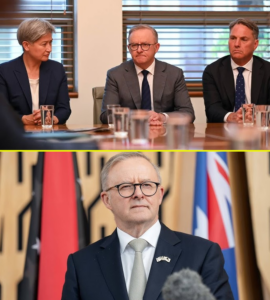Albanese Accused of Misleading the Public Regarding China’s Actions in the Tasman Sea

In a new political controversy that has raised serious questions about transparency, Australian Prime Minister Anthony Albanese is facing accusations of misleading the public over China’s activities in the Tasman Sea. The allegations come after a series of reports suggested that the Chinese government has been involved in increasingly aggressive actions in the strategically significant waters, actions that Albanese had previously downplayed or denied.
The Tasman Sea, which lies between Australia and New Zealand, has long been a critical area for maritime trade and regional security. Recent reports have sparked concerns about Chinese influence and military activity in the region, leading to heightened tensions in Australian politics. While some believe the government has been too lenient in its responses, Albanese’s handling of the situation has now come under fire, with critics accusing him of downplaying the issue to maintain diplomatic relations with Beijing.
The Allegations: What’s Really Happening in the Tasman Sea?
The controversy revolves around China’s increasing presence in the Tasman Sea, including reports of surveillance activities and possible military maneuvers near Australian territorial waters. While Albanese has publicly referred to the situation as a matter of “regional cooperation” and has avoided direct confrontation with China, opposition leaders and defense experts are now questioning his portrayal of the issue.
Reports indicate that China has deployed naval and aerial resources in the region, and there are concerns that Beijing may be trying to expand its influence in areas traditionally considered part of Australia’s strategic sphere. These developments have raised alarms within the Australian defense establishment, who fear that China’s actions could undermine the country’s security interests.
Albanese’s Response: A Matter of Diplomacy?
In response to the accusations, Albanese has defended his stance, emphasizing the importance of maintaining diplomatic ties with China. He has repeatedly argued that Australia’s relationship with China is one of mutual respect, and that the nation’s actions in the Tasman Sea have been misconstrued by political opponents. According to Albanese, the government’s approach has been to handle the situation with “calm diplomacy,” a move he believes will prevent unnecessary escalation.
However, critics argue that his approach has been overly cautious and has allowed China to continue its activities unchecked. Some opposition leaders have gone so far as to accuse Albanese of intentionally downplaying the situation to avoid alienating China, which remains Australia’s largest trading partner.
The Political Fallout
The allegations that Albanese has misled the public have sparked a heated debate in the Australian Parliament, with opposition parties demanding a full investigation into the Prime Minister’s handling of China’s activities in the Tasman Sea. Some experts argue that the government’s failure to publicly address the growing concerns could damage Australia’s credibility on the international stage, particularly when it comes to issues of national security.
The controversy has also raised questions about Australia’s broader foreign policy strategy, particularly in the context of its relationship with the United States and other regional allies. With tensions rising between China and the West, many are wondering if Albania’s diplomacy will be enough to navigate the increasingly fraught geopolitical landscape.
Looking Ahead: What Happens Next?
As the political fallout from these revelations continues, Prime Minister Albanese faces mounting pressure to clarify his position and reassure the public that Australia’s national security is not being compromised. Whether the government will take a more assertive stance against China in the Tasman Sea remains to be seen, but the situation is likely to play a key role in shaping Australian foreign policy in the coming months.
This controversy over Albanese’s handling of China’s actions in the Tasman Sea has opened a new chapter in the debate about Australia’s place in the Indo-Pacific region. As the world’s largest trading partners, both Australia and China will have to find a way to balance economic cooperation with the growing challenges posed by regional security concerns.
News
“Fox News’ The Five Makes History by Beating CNN and MSNBC—First Non-Primetime Show to Dominate Cable News Ratings!”
“Fox News’ The Five Makes History by Beating CNN and MSNBC—First Non-Primetime Show to Dominate Cable News Ratings!” In a…
“Why Is Dana Perino Missing from Fox News? Fans Are Fearing the Worst After Her Sudden Disappearance”
“Why Is Dana Perino Missing from Fox News? Fans Are Fearing the Worst After Her Sudden Disappearance” Fox News viewers…
“Ryan Seacrest Teases Engagement and Reveals a Mystery Woman—Fans Can’t Stop Speculating About His New Love!”
“Ryan Seacrest Teases Engagement and Reveals a Mystery Woman—Fans Can’t Stop Speculating About His New Love!” Ryan Seacrest, the ever-charismatic…
“Ryan Seacrest’s Secret Bad Habit That Ruined His Partnership with Kelly Ripa on Live—Is This Why They Went Separate Ways?”
“Ryan Seacrest’s Secret Bad Habit That Ruined His Partnership with Kelly Ripa on Live—Is This Why They Went Separate Ways?”…
SHOCKING TWIST! Sidwell Reveals Spencer Didn’t Die—He’s Alive, and What He’s Been Hiding Since His “Death” on General Hospital Will Leave You Speechless…
SHOCKING TWIST! Sidwell Reveals Spencer Didn’t Die—He’s Alive, and What He’s Been Hiding Since His “Death” on General Hospital Will…
It’s Official: CBS Drops $700 Million to Launch Megyn Kelly & Candace Owens as The View’s Ultimate Rivals—This Explosive Morning Show Duo Promises No Censorship, No Apologies, and No Holding Back!
It’s Official: CBS Drops $700 Million to Launch Megyn Kelly & Candace Owens as The View’s Ultimate Rivals—This Explosive Morning…
End of content
No more pages to load












